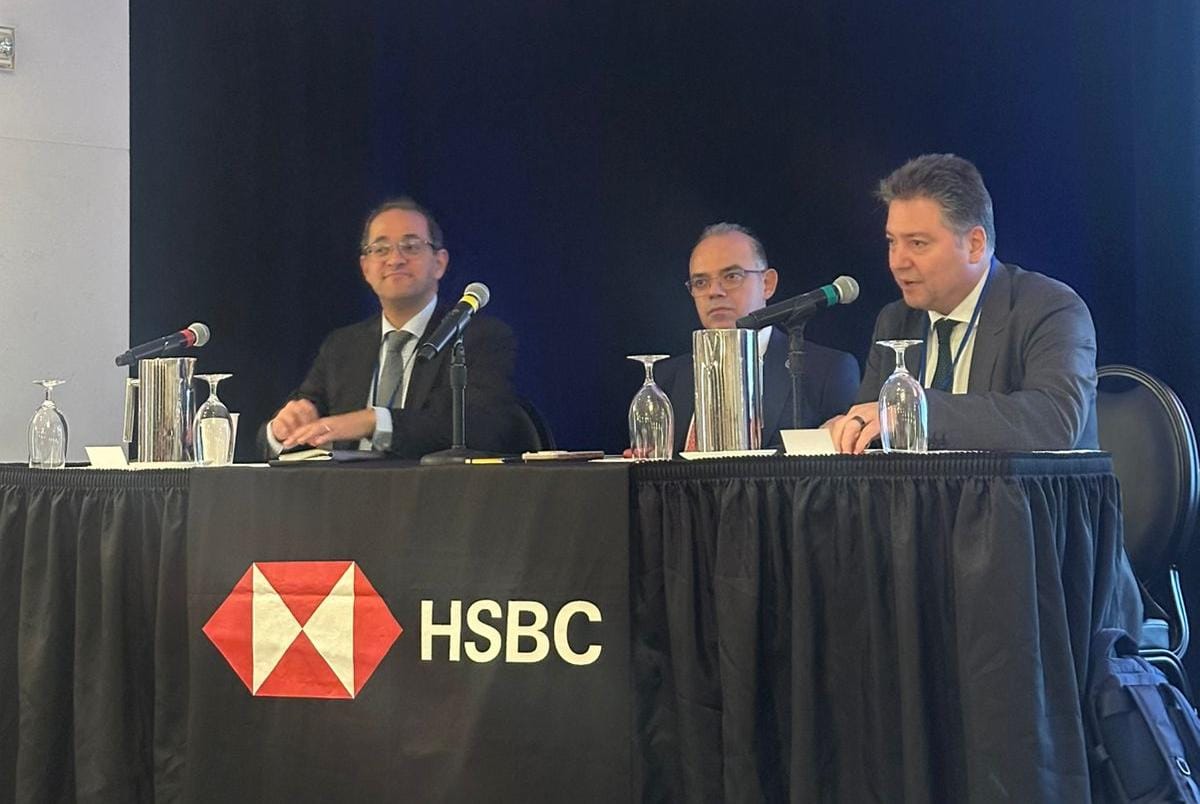- FRA is cooperating with Ministry of Finance to develop the Primary Dealers system and explore the issuance of Treasury bonds and bills directly to individuals.
- Digital transformation is a foundational pillar for significantly boosting financial inclusion across the Non-Banking Financial Sector (NBFS).
- We are pursuing continuous efforts to enhance financial stability in non-banking markets while promoting integrity and transparency.
- The Authority is actively studying international experiences in regulation and supervision to maximize the efficiency and competitiveness of local markets.
In a move to strengthen ties with the global investment community, Dr. Mohamed Farid, FRA Chairman participated in a high-profile open dialogue with international investors and representatives of major financial institutions. The event, hosted by Jefferies and HSBC in Washington D.C., took place on the sidelines of the World Bank Group-IMF Annual Meetings.
Dr. Farid’s participation alongside Dr. Rania Al-Mashat, Minister of Planning and Economic Development and International Cooperation and Mr. Ahmed Kouchouk, Minister of Finance underscored the integrated efforts of Egypt’s economic institutions. This unified presence was key to present Egypt’s comprehensive vision for financial reform and economic stability to the global investment audience. This meeting served as a crucial platform to highlight the continuous coordination among government entities dedicated to improve business environment and deepen capital markets. Such coordination is vital for boosting investor confidence and supporting Foreign Direct Investment (FDI) flows. The session also provided a valuable opportunity to exchange views on the economic, financial and regulatory policies that are enhancing the resilience and investment attractiveness of the Egyptian economy amid accelerating global changes.
During the meeting, Dr. Farid reviewed the latest developments within Egypt’s Non-Banking Financial Sector (NBFS). He explained that FRA aims to build an integrated system that enhances market efficiency and strengthens its ability to overcome economic challenges. He affirmed that developing legislative and regulatory frameworks is a main pillar of the Authority’s work to keep pace with global changes, with a strong focus on improving the business environment and promoting governance, disclosure and transparency. He further stressed FRA’s commitment to achieve a sustainable balance between economic growth and financial stability through advanced supervisory mechanisms that ensure consumer protection and effective risk mitigation.
FRA Chairman highlighted that these ongoing efforts are designed to boost the NBFS’s attractiveness as a key engine for attracting foreign investment. This is achieved by firmly establishing confidence in the regulatory framework and ensuring procedural transparency. FRA continues to execute a comprehensive plan to develop the investment environment and improve the efficiency of supervisory operations in line with international best practices. These efforts directly raise the competitiveness of the Egyptian market and support Egypt’s position as a promising financial hub in the region.
In this context, Dr. Farid highlighted the ongoing cooperation between FRA and Ministry of Finance to develop the Primary Dealers system and explore mechanisms for issuing Treasury bonds and bills directly to individuals. This collaboration provides new investment opportunities and significantly diversify investors’ base in local debt market. He stressed that continuous coordination with relevant authorities is vital for integrating development efforts, enhancing market efficiency and aligning financial and regulatory policies with national economic development goals.
FRA Chairman explained that digital transformation is now a strategic imperative for developing the Non-Banking Financial Sector (NBFS) and ensuring its capacity for sustainable growth. He added that FRA is adopting a comprehensive strategy to modernize the technical infrastructure and facilitate safe, efficient access to financial services through digital channels. He affirmed that this digital shift not only improves data quality, enhances transparency and raises the efficiency of regulation and supervision, but also unlocks new potential for innovative financial products that deepen financial inclusion and directly support the national economy.
Dr. Farid added that FRA is prioritizing national efforts to enhance financial inclusion. This goal is achieved by making diverse financial products available to suit the needs of both individuals and institutions, thereby enabling wider segments to access financial services in an organized and sustainable manner. He affirmed that the Authority employs proactive policies to enhance market efficiency and soundness, consistently maintaining a crucial balance between the requirements of growth and stability in alignment with the state’s vision for sustainable development.
FRA Chairman explained that efforts to enhance financial stability rely on an integrated approach combining effective governance and proactive supervision. This includes developing robust systems capable of monitoring and mitigating risks through measured mechanisms, which guarantees consumer protection and preserves the soundness of the financial system. He pointed out that the Authority relies heavily on expanding the use of advanced financial data and analytics to support decision-making and improve supervisory efficiency, thereby promoting institutional discipline and curbing non-compliant market practices.
Dr. Farid asserted that establishing the values of integrity and transparency is the cornerstone of building a strong and sustainable financial market. FRA is keen to spread a culture of disclosure and institutional responsibility, encouraging companies to adhere to the highest standards of governance and professional conduct. Furthermore, raising investor awareness of their rights and obligations is essential, as it enhances trust and credibility among all market participants, contributing to the establishment of a stable and balanced financial environment.
Dr. Farid added that FRA is dedicated to study advanced international experiences in financial regulation and supervision. This involves analyzing models from both emerging and advanced markets to extract mechanisms best suited for Egypt. This strategic approach ensures a crucial balance: maintaining openness to global best practices while preserving the unique structure of the national regulatory framework. He affirmed that international cooperation and the exchange of expertise are fundamental to develop FRA’s technical capabilities and boost the competitiveness of the Egyptian market through effective partnerships with global regulatory bodies.
FRA Chairman concluded by emphasizing that these comprehensive efforts underscore the Authority’s unwavering commitment to support the national economy and enhance the competitiveness of Egyptian markets regionally and internationally. The ultimate goal is to move decisively toward building a Non-Banking Financial Sector that is significantly more efficient and sustainable.
Last modified: October 16, 2025
